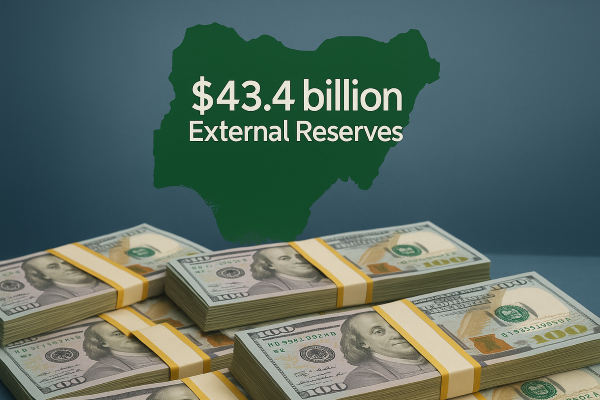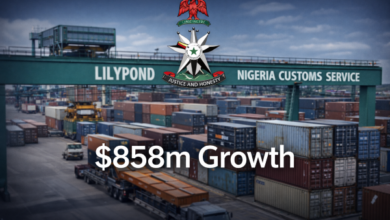$43.4bn Reserves Lift Naira, Strengthen Investor Confidence and Nigeria’s Economic Stability

Nigeria’s external reserves have surged to $43.4 billion, their highest level in five years — a development experts say signals renewed investor confidence, greater currency stability, and a potential turning point for Africa’s largest economy.
The Central Bank of Nigeria (CBN) confirmed that as of October 10, 2025, the reserves could cover 11 months of imports, a rare feat in recent years. This fiscal turnaround, analysts note, reflects improved foreign exchange management, prudent policy reforms, and growing inflows from diaspora remittances, portfolio investments, and export earnings.
Confidence Returns to the Naira
According to Dr. Muda Yusuf, Chief Executive Officer of the Centre for the Promotion of Private Enterprise (CPPE), the rising reserves underscore both domestic and foreign confidence in Nigeria’s reform agenda.
“This is an indication that investors’ and citizens’ confidence is improving. It’s a reflection of fiscal discipline and effective policy execution,” Yusuf said.
He noted that while macroeconomic fundamentals are stabilizing, policymakers must ensure that the improved reserves translate into real benefits for citizens through lower living costs and enhanced business productivity.
From Crisis to Credibility
Only a year ago, Nigeria’s reserves had dipped to $33.28 billion as of September 2023, down from $37.1 billion in December 2022. The sharp recovery in less than a year signals the success of reforms aimed at restoring investor trust, improving transparency in forex markets, and tightening fiscal discipline.
Experts attribute the turnaround to the CBN’s efforts in clearing FX backlogs, rationalizing subsidies, and improving inflows through policy alignment with global financial institutions such as the IMF and World Bank.
Private Sector Experts Urge Productive Investment
Mr. McAntony Dike, former President of the Chartered Institute of Taxation of Nigeria (CITN), applauded the rebound but urged the government to leverage the reserves for economic diversification rather than short-term consumption.
“When investors see consistency and a supportive business climate, they are encouraged to inject capital. Stability must now be matched with productivity,” Dike noted.
He added that fiscal authorities should prioritise security, infrastructure, and digital governance to sustain investor confidence and stimulate growth in key industries such as manufacturing, mining, and ICT.
Reserves Must Work for Nigerians
For Mr. Sunny Nwosu, founder of the Independent Shareholders Association of Nigeria (ISAN), the reserves milestone should not be celebrated in isolation.
“What matters now is how this success improves lives — through job creation, local production, and reduced import dependency,” he said.
Nwosu emphasised that gains in external buffers must directly support agriculture, power, and industrialization, ensuring long-term resilience for the Nigerian economy.
Macroeconomic Stability Gains Momentum
CBN Deputy Governor for Economic Policy, Mohammed Abdullahi, speaking at the Nigeria Investors Forum in Washington D.C., confirmed that the naira had stabilised, with the gap between official and parallel market exchange rates now below 3%, compared to over 50% in 2022.
He also revealed that inflation had eased to 18.02%, the lowest in three years — a sign that the monetary tightening cycle and supply interventions are yielding measurable outcomes.
BRANDECONOMY ANALYSIS
Nigeria’s improved reserves offer more than a statistical milestone — they represent a restored foundation for confidence, credibility, and competitiveness. However, history cautions that financial buffers can quickly erode without structural follow-through.
To sustain the momentum:
- Convert Stability to Prosperity:
The reserves must translate into affordable credit, productive investments, and lower import dependency. Without structural transformation, currency stability remains fragile. - Promote Transparency and Fiscal Discipline:
Nigeria’s long-term growth depends on strict adherence to expenditure controls and prudent debt management. Leakages in public spending must be curbed to prevent another fiscal slide. - Build Export Capacity:
A strong reserve base should fuel incentives for non-oil exports, local value addition, and renewable energy development, positioning Nigeria for global competitiveness. - Ensure Social Impact:
Economic data must reflect in citizens’ welfare. As inflation pressures ease, households must feel the benefits through lower food prices, stable energy costs, and accessible finance.
Nigeria’s $43.4 billion reserve milestone is a signal of hope — but the next phase must focus on turning monetary stability into measurable prosperity.










